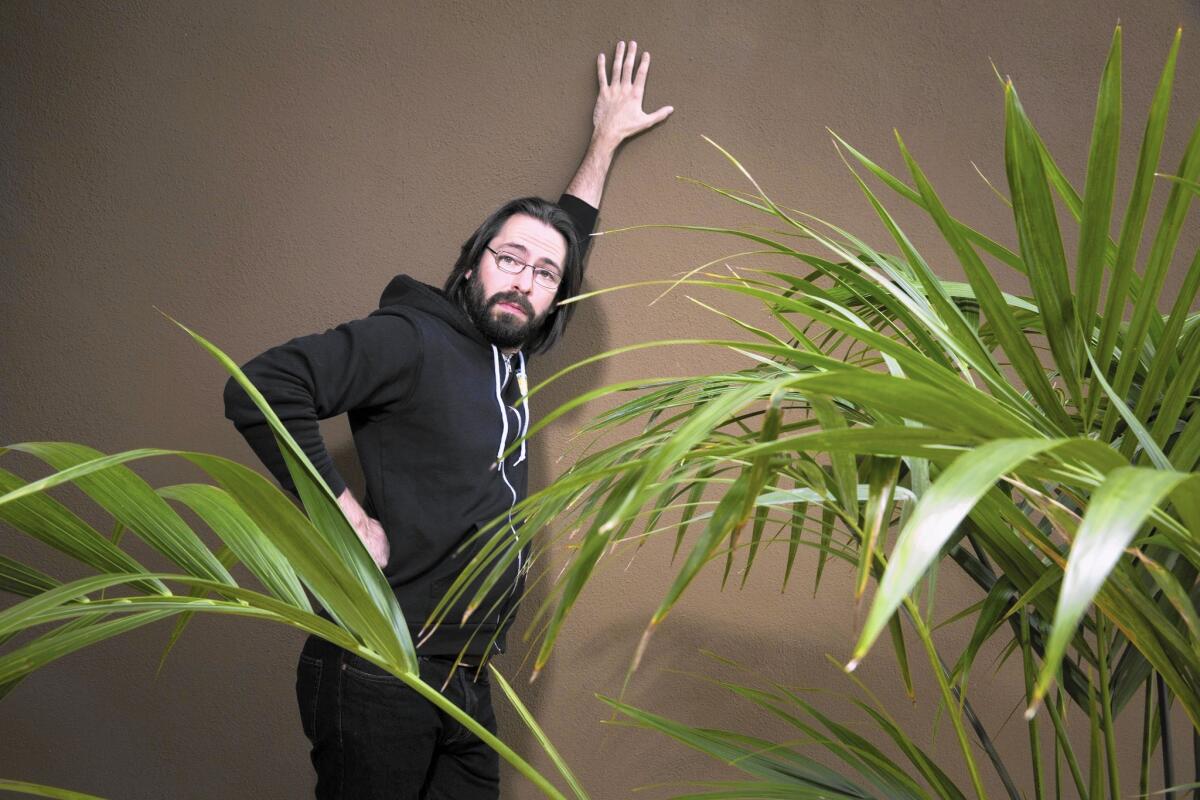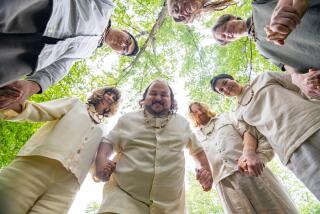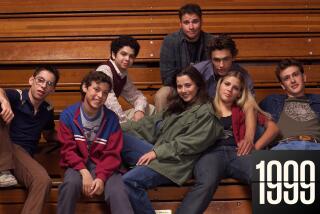Martin Starr would rather avoid the fame game

Martin Starr is great at playing the guy nobody wants to be friends with. He’s been a bespectacled nerd with a peanut allergy (“Freaks and Geeks”), a stoner who doesn’t shave his beard for a year (“Knocked Up”) and a permanently grouchy computer programmer (“Silicon Valley”).
At 32, the actor is finally getting the chance to move away from his deadpan shtick in this month’s “I’ll See You in My Dreams.” There’s no misanthropy here: Starr plays a pool boy who becomes unlikely pals with a septuagenarian (Blythe Danner). He takes her out for a night of karaoke, kills a rat in her house and even writes her a song.
This is a movie about senior citizens. Do you like them?
I find the most interesting thing about that age group to be how, in general, they’ve lost a conscience. So there’s a lack of anxiety about who they are and how they’re perceived. So instead of wasting time trying to be something or someone that they aren’t — or trying to avoid talking about something or offending somebody — they just don’t care. So then you get the most interesting and honest conversations. It’s the same as talking to kids, in a sense.
You’ve been around adults since you were a kid, right?
I was 16 when I was on “Freaks and Geeks.” I remember people saying, “You’re so mature for 16.” I don’t know that that was necessarily true. The teacher on set had to wrangle me because I wouldn’t go to school. I hated school. They would be like, “OK, now Martin has to go to school.” And I would physically run away from the teacher.
You played a huge nerd on that show. Nowadays, it’s become trendy to self-identify as a nerd. Why do you think that is?
I think it implies that you’re smart. But it’s like, you’re not a nerd if you have to say it.
Yeah, people will say, “Oh, I’m such a nerd. I stay in on Friday nights and watch Netflix.”
That’s not the right use of the term. You’re an introvert. You’re a hermit.
Speaking of Netflix: People love to binge-watch “Freaks and Geeks” and “Party Down,” two shows you were on that were quickly canceled but have since gained cult followings. Does it annoy you that people discovered those shows too late?
What are you gonna do? Just the fact that we got to make any of those shows — those are golden moments already. We went further than most people go.
On “Party Down,” you played a struggling writer who works as a caterer to make ends meet. Did that experience affect your attitude toward waitstaff?
I was never not nice to caterers. I’ve always tipped well as long as I haven’t been totally broke. I’m really fortunate to be able to make more money than I deserve for what I do. So I absolutely show my appreciation — especially to the people who give 120% to that job. You could be the worst server in the world, but I never tip less than 20%. Just because I know I couldn’t do that job any better.
You seem to be trying something new, acting-wise, with this film. Were you tired of playing an unlikable guy?
I agree that this is a total offshoot of any of the things I’ve done before. There’s such a natural tone and a slow pace to the whole movie itself. I had the opportunity to take a breath in a scene. Often, the direction you get back after a take is “Let’s do it again and speed it up.” And that was not the case on this.
Your costar in “I’ll See You in My Dreams,” Blythe Danner, thinks you have a Buddha-like quality.
I was raised Buddhist. We talked about that a little bit when we got together the first time. I definitely have anxieties and neuroses, but as a whole I try to stay pretty centered and mellow.
What tenets of the religion have stuck with you?
Fundamentally, Buddhism is rooted in self-discovery and growth and development inside yourself. The knowledge that you have the power inside yourself to attain any dream that you have.
Like acting.
I had a breakdown in my mid-20s — right around the time we did “Knocked Up” — where I didn’t know whether I wanted to keep working. Then that [movie] happened and I couldn’t really go back in time. Anonymity is something you don’t appreciate until it’s gone. I’m a private person. I don’t like to be gawked at. ... You become a thing. You become an animal in a cage. There’s something about fandom that I don’t connect with. If I ever did meet my idol, I would be so much more interested in having a small conversation with them than asking for a picture.
There’s nobody you would ask to take a photo with?
I would maybe take a Polaroid with someone. But that’s not to share with anybody. I feel like there’s this evidence thing — like, “Put it up on Instagram!” — and it’s somehow proof that you’ve achieved something that you haven’t achieved. There are these weird little status symbols — “Look where I am, look who I met, look what I saw.” And I just don’t abide by that kind of stuff.
How do your friends in the business handle attention?
Will Ferrell, Adam Sandler, Paul Rudd — they’re the people I’ve been around that are so gracious. They know how to treat people in a way so that [fans] walk away with a bigger love in their hearts for who they are — even if the way that [the fans] approach them isn’t totally respectful. I don’t abide by that. If someone is rude to me, I have no problem dealing with it appropriately. When people are gracious and kind, I have nothing but kindness back. But there are times when I don’t want to take a picture. I might be in the middle of doing something that’s more valuable to me than taking a picture with someone I don’t know. And I’m sorry, but that’s my life, and I have that right.
So if someone sees you on the street and recognizes you, what should they do?
What I feel best about is just people that walk by and are like, “You’re awesome. Can I get a high five?” I’ve heard that Bill Murray just carries around these cards that are signed and when he meets somebody, instead of doing a photo, he hands them a card and that’s the end of the interaction. You got what you wanted — which is something to remember this by — and he gets to continue doing whatever he wants to continue doing with his day.
You could try it.
It seems pompous for me to do that right now.
Twitter: @AmyKinLA
More to Read
Only good movies
Get the Indie Focus newsletter, Mark Olsen's weekly guide to the world of cinema.
You may occasionally receive promotional content from the Los Angeles Times.











